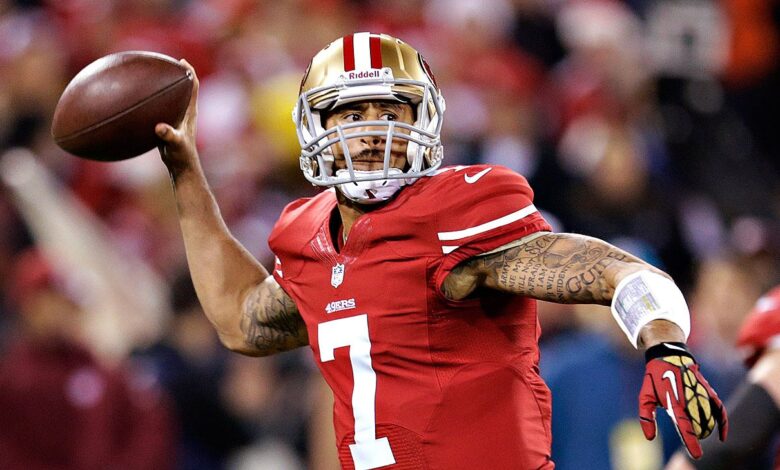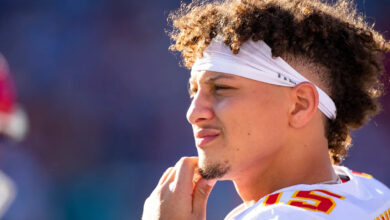A look at 100 years of diversity in the NFL

The National Football League, celebrating its 100th season this year, has undoubtedly had a dramatic impact on our society ever since it was created in Canton, Ohio, in 1920. To put this into perspective, consider that the NFL has been a part of our lives since before the dawn of television, before the first interstate highway was constructed, and before McDonald’s served its first hamburger. It started at a time when so many people were immigrating to the Unites States from various parts of the world in search of the American dream. Despite the social and political challenges that often divide us, the NFL became something that bonds Americans together, at least for one day a week.
Although the NFL went through a period of segregation from 1934 to 1946, it may have helped that the NFL was created in 1920 with African-American players and coaches. Robert “Bobby” Marshall and Frederick “Fritz” Pollard are credited as the first African-American professional football players in the NFL. Pollard led his team, the Akron Pros, to the first league championship in 1920 and was a player and co-head coach in 1921.
Over the years, an average fan might consider the NFL as a diverse and inclusive sports league. It’s easy for anyone to make this conclusion based upon its star athletes. Most NFL fans can identify African-American legends such as Jim Brown, Walter Payton, Doug Williams, Barry Sanders, Emmitt Smith, Jerry Rice, Lawrence Taylor and Reggie White. That carries over to today’s stars like Cam Newton, Russell Wilson, Dak Prescott, Saquon Barkley, Odell Beckham Jr., Antonio Brown, Aaron Donald, and Julio Jones. In fact, 70 percent of the NFL players were African-American in 2018, up from 66 percent in the 2017 season. It is a completely different picture when we look deeper into the ranks of the league and team management. We find that head coaches, owners and senior management (vice president and above) at the team level are still dominated by white males and not representative of the players. More importantly, the diversity of the personnel in these influential positions are far from representative of the percentage of people of color or women in the general population, let alone the NFL.
I have been writing the Racial and Gender Report Card since 1988. It is now published by The Institute for Diversity and Ethics in Sport (TIDES) at the University of Central Florida. The report cards have become the definitive assessment of hiring practices of women and people of color in the NFL, NBA, WNBA, Major League Baseball, Major League Soccer and the sports media. For most of the first decade, the NFL was mired in the C category for both racial and gender hiring practices. As a graduate school professor, I consider any grade below a B to be a failure.
In 2002, civil rights attorneys Cyrus Mehri and Johnny Cochran worked with University of Pennsylvania economics professor Dr. Janice Madden to issue a report cal led ”Black Coaches in the NFL: Superior Performance, Inferior Opportunities.” I went with Mehri to present the report and talk about legal actions that might be taken if the NFL did not move on the issue. The NFL was represented by Executive VP & CAO Jeff Pash, NFL Executive VP/Labor Relations and Management Council Chair Harold Henderson and Washington-based attorney Tom Williamson. Though it was a tense meeting, Mehri and I felt that change was possible.
In 2003, the NFL adopted the Rooney Rule, requiring teams to interview at least one candidate of color for head coaching positions. Prior to the rule there were six head coaches of color and one general manager of color between 1990 and 2002. Since the rule’s inception in 2003, the number of coaches of color increased to 18 and general managers increased to eight.
When the 2004 NFL Racial and Gender Report Card (RGRC) was released, the NFL earned a racial hiring grade of B and a gender hiring grade of D+. In the 2018 RGRC, the NFL earned an A- for racial hiring practices. This marked the ninth consecutive year of earning an A- or higher. There has been an upward trajectory for racial hiring in the league office and front offices for 15 years.
Gender hiring has lagged far behind. The 2004 D+ has improved to only a C in 2018. Though the NFL has expanded opportunities for women, especially in the league office, it still falls far short in providing opportunities for women in senior management roles at the team level.
Then there is the issue of athlete activism, social justice and community involvement. Colin Kaepernick once made headlines on the field but he is now better known off the field as the NFL’s 100th season starts. He led his team to the Super Bowl in 2013 and then, in 2016, he used his platform to bring attention to social justice issues surrounding athlete activism, racial inequality and police brutality. His peaceful method of bringing awareness to these issues cost him a career that he spent years learning and perfecting. His cause received major media coverage and highly charged public attention. That all exploded in September 2017 when President Trump spoke at a campaign rally in Huntsville, Alabama. Trump called on NFL owners to release players who demonstrated during the national anthem.
The next day, NFL commissioner Roger Goodell hit back saying, “Divisive comments like these demonstrate an unfortunate lack of respect for the NFL, our great game and all of our players, and a failure to understand the overwhelming force for good our clubs and players represent in our communities.”
On Sept. 24, virtually every team witnessed protests during their games. Some owners and coaches joined players. That display was the most important day in the history of player activism since Muhammad Ali refused to join the Army during the war in Vietnam. Thank you, NFL, your players and especially you, Colin Kaepernick.
In 2018, Nike teamed up with Kaepernick to film and release a powerful advertising campaign that reignited the debate surrounding athlete activism as well as racial and gender inequality. Soon after the Nike ad, in conjunction with its 32 teams and the Players Coalition, the NFL announced the start of a social justice platform that has led to the Inspire Change initiative that has a goal of creating positive change with community and police relations, education and economic development, and criminal justice reform.
Just a few weeks ago, leading up to the 2019 season opener, the NFL took a bold step. The NFL announced its partnership with Roc Nation, an entertainment company founded by rapper Shawn “Jay-Z” Carter, to “strengthen our communities through music and the NFL’s Inspire Change initiative.” The opportunities seem boundless as Jay-Z brings his musical talent and passion for sports to the global platform of the NFL. The NFL has essentially linked the power of sport and the power of music with the intent to bring a significant number of people closer together to better understand and discuss the social issues that often divide us as a nation.
While many people have been vocal critics of this partnership, I am encouraged by what this union can do. Nonetheless, Jay-Z and the NFL need to reach out to Colin Kaepernick to listen and embrace his ideas. I am reassured that the NFL is making a commitment toward social change. However, as the saying goes, one must lead by example. As the NFL has sought the external inspiration and expertise of Jay-Z, it should look internally and create a more diverse and inclusive workplace.
The Fritz Pollard Alliance is an influential organization “comprised of scouts, coaches and front office personnel in the NFL as well as other sports professionals committed to equal opportunity in the industry.” In 2018, the NFL’s Diversity Committee met with representatives of the Fritz Pollard Alliance to discuss proposed changes to the Rooney Rule. Based on those discussions, the committee made changes to further improve the Rooney Rule and give candidates of color an even more fair chance to compete and allow the best candidate to be hired.
I continue to encourage the NFL to listen to the men and women of the Fritz Pollard Alliance on how it can create a more diverse and inclusive workplace while also building a stronger relationship within their communities through their partnership with Roc Nation and Jay-Z. These two relationships together can create a stronger league, a stronger community and a stronger country.
Looking back, the NFL did something MLB and the NBA did not do in their first seasons. The NFL had African-American players, like Fritz Pollard, playing professional football in its first season. The NFL had no African-American players between 1934-46 until the Los Angeles Rams signed Kenny Washington, who ironically played baseball and football with Jackie Robinson at UCLA. Once again the NFL became integrated. MLB did not have an African-American player until Jackie Robinson played his first game in 1947 for the Brooklyn Dodgers. The NBA did not have an African-American player until Nat “Sweetwater” Clifton became the first to sign an NBA contract. Clifton, Earl Lloyd and Chuck Cooper integrated the NBA in 1950.
Women are assistant coaches in all the major men’s leagues now and it seems likely that we will soon see a woman as a head coach of a men’s professional team. Most expect that to be in the NBA, but wouldn’t it be truly groundbreaking if it was in the NFL?
With a product that is so enduring, recognizable and popular, there is probably some truth to the thought that the NFL’s Super Bowl is a national holiday. The real truth is that the history of the NFL epitomizes the power of sport and the NFL should embrace its heritage and capacity to be a leader of social change in the United States.
TIDES issued this year’s Complete Racial and Gender Report Card on Aug, 15. The Complete Racial and Gender Report Card is a comprehensive analysis and comparison of the hiring practices of Major League Baseball, the National Basketball Association, the Women’s National Basketball Association, the National Football League, Major League Soccer and college sport.
David Zimmerman made significant contributions to this column.
Richard E. Lapchick is the chair of the DeVos Sport Business Management Graduate Program at the University of Central Florida. Lapchick also directs UCF’s Institute for Diversity and Ethics in Sport, is the author of 17 books and the annual Racial and Gender Report Card, and is the president of the Institute for Sport and Social Justice. He has been a regular commentator for ESPN.com on issues of diversity in sport. Follow him on Twitter @richardlapchick and on Facebook.




